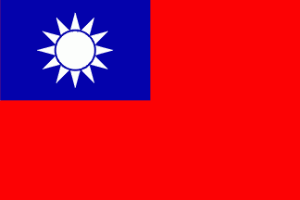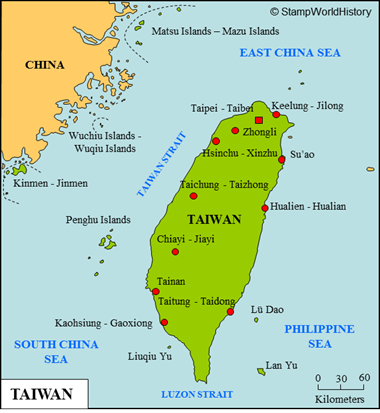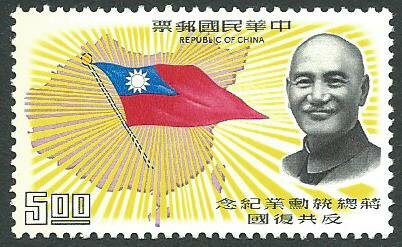中国

China – Taiwan
Quick reference
General issues: Republic of China 1949-present
Country name on general issues: China, China in Chinese characters
Special issues: Local issues 1887-1888, Black Flag Republic 1895, Japanese administration 1945, Provincial issues 1945-1949
Currency: 1 Yen = 100 Sen 1945-1947, 1 (Taiwan) Dollar = 100 Cent 1947-present
Population: 7 708 000 in 1949, 23 373 000 in 2013
Political history Taiwan
Taiwan – formerly called Formosa – is an island off the coast of China in eastern Asia. Taiwan has long been part of the Chinese Empire. After the First Sino-Japanese War, Taiwan is ceded to Japan in 1895. The Taiwanese oppose the cession to Japan and proclaim independence as the Black Flag Republic. The Black Flag Republic is short lived. It is put down by the Japanese when they actually take possession of the island later in 1895. After WWII, in 1945, the Allies award Taiwan to the republic of China. As China is not able to establish Chinese rule immediately, Japan – upon request of the Allies – governs Taiwan for yet a few months more until in October 1945 when the Chinese take over and Taiwan becomes a Chinese province. Japan formally returns Taiwan to China in 1952.
China has, for over 2000 years, been an empire. In 1912, imperial rule is replaced by that of the Republic of China. The Nationalist Party becomes the ruling party, as of 1925, led by Chiang Kai-shek. After its establishment in 1921, the Communist Party gradually increases its influence. As of 1927, China is in a state of civil war. The Japanese occupation of China, from 1937 until 1945, causes the Nationalists and the Communists to join forces in the fight against Japan. After the Japanese capitulation in 1945, however, the fights resume and the Communists, by 1949, have gained control over the Chinese mainland and establish the Peoples Republic of China. The Nationalists, still led by Chiang Kai-shek, withdraw to Taiwan where the Republic of China is continued to this day. A number of small islands just off the coast of mainland China fall under the jurisdiction of Taiwan.

Taipeh
The Republic of China, as established on Taiwan, is internationally long recognized as the legitimate government of China. However, the international support for the Peoples Republic gradually increases and, in 1971, the Republic of China is replaced by the Peoples Republic of China in the United Nations as the sole representative of China. Taiwan is governed by the Nationalist Party in a single party system until, in the 1980’s, reforms turn Taiwan into a parliamentary democracy with a multi party system. Economically, Taiwan has been successful. It is one of the ‘Asian Tigers’ – one of the countries in Asia that since the 1960’s have shown significant economic growth.
Postal history Taiwan
The first stamps issued specifically for Taiwan are stamps issued by the governor of the province of Taiwan as he set up a postal service on the island in 1887 – the Imperial Chinese Post not being established until 1897. When Taiwan was ceded to Japan in 1895, the short lived Black Flag Republic issued stamps, which in the same year were superseded by the stamps of Japan. The stamps of Japan were used on Taiwan until 1945. During the few months in 1945 that the Japanese rule Taiwan, even after it has been awarded by the Allies to China, the Japanese issue stamps again specifically for Taiwan. These are followed by the issues of the Republic of China of which Taiwan next becomes a province. For Taiwan, specific stamps are issued between 1945 and 1949. The first stamps issued are overprints on the stamps issued by the Japanese in 1945, followed by overprints on stamps of the Republic of China and definitives. Some of the first definitives are of the same design as those issued by the Republic of China for the Northeast Provinces. From 1949 until today, the Republic of China, as established on Taiwan, issues stamps – inscribed ‘Republic of China’, in 2007-2008 ‘Taiwan’ and currently ‘Republic of China Taiwan’. Taiwan is a member of the U.P.U. until 1972, when its membership is transferred to the Peoples Republic of China.
A note on transliteration
As China opened up to the Western world in the 19th century, several different systems have been developed for the transliteration of Chinese to the Latin alphabet – Wade-Giles being the most used system in the Anglo-Saxon world. In the second part of the 20th century the Peoples Republic of China developed a new system that has become the worldwide standard for transliteration of the Chinese language. The system is called Hanyu Pinyin or Pinyin. Pinyin has been adopted also by Taiwan in 2009. Many texts – including official texts – are however still in Wade-Giles based transliterations. In this profile I follow suit and use Wade-Giles. The map in this profile shows place names in Wade-Giles and Pinyin.
Album pages
← Previous page: China - RepublicNext page: Cochin China →





Gerben,
Please take attention, that the stamps of Taiwan were issued with the state inscription Taiwan (without Republic of China) in 2007-2008, and later – with the inscription Republic of China Taiwan. Gedi
Thanks Gedi. Interesting, I wasn’t aware. I’ve updated the profile.